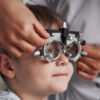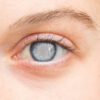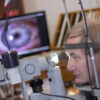A common condition mainly affecting people above the age of 65, dry eye syndrome can occur for several reasons. From not producing enough ‘quality’ tears to tears evaporating too quickly, the condition is caused when a person struggles to naturally lubricate their eyes.
People with the condition often experience irritation and inflammation around the eyes, with other symptoms including light sensitivity, stringy mucus, blurry vision and redness. In addition, stinging, scratching and burning sensations around the eyes are common symptoms of dry eye syndrome.
Despite its name, people suffering with dry eye also tend to generate too many tears, meaning they do not cover the protective outer layer of the eye, medically known as the cornea. When a person’s tears fail to cover the entire eye, they are more at risk of developing dry eye.
Tears offer vital protection for the eyes as they combat infection, remove harmful bacteria and help the eye to maintain a soft surface. Formed by oil, water and mucus, tears are created through multiple glands that are located around the eyelids.
However, this production process often deteriorates as a person gets older, with most over 65s experiencing some aspects of dry eye. The condition is also more common amongst females, due to pregnancy, contraceptive medications and the menopause all instigating hormone changes.
Dry eye can also be caused by some medical illnesses, including rheumatoid arthritis, thyroid complications and diabetes, all of which can diminish tear production. Equally, several medications can reduce the overall number of tears produced, including antihistamines, decongestants, antidepressants, decongestants and blood pressure medicine.
Other causes of dry eye include:
- Weather conditions – Windy and dry environments cause dry eye by making tears evaporate quicker than normal
- Digital screens – Frequent interaction with computer screens or smartphones for long intervals increases a person’s risk of developing dry eye
- Contact lenses – The continuous wearing of contact lenses can irritate the eye, resulting in dry eye
- Refractive eye surgeries – LASIK and other clinical eye procedures can diminish tear production and cause dry eye.
As dry eye syndrome affects the lives of thousands of people living in the UK, various theories on how to prevent the condition developing have emerged, including staying dehydrated, stopping excessive amounts of air going into your eyes and reducing your time spent in drier climates. Frequent blinking when engaging with an activity for a long period of time and wearing sunglasses to block wind and sun is highly recommended. Healthcare professionals can also prescribe supplements to treat symptoms of dry eye.
The condition can develop for multiple reasons and it affects everyone differently, with each person experiencing different symptoms.
To find which of our specialist dry eye treatments would best suit you visit https://www.tks-optometrists.co.uk/specialist-services/dry-eye/ or call us today on 01604 714413.





